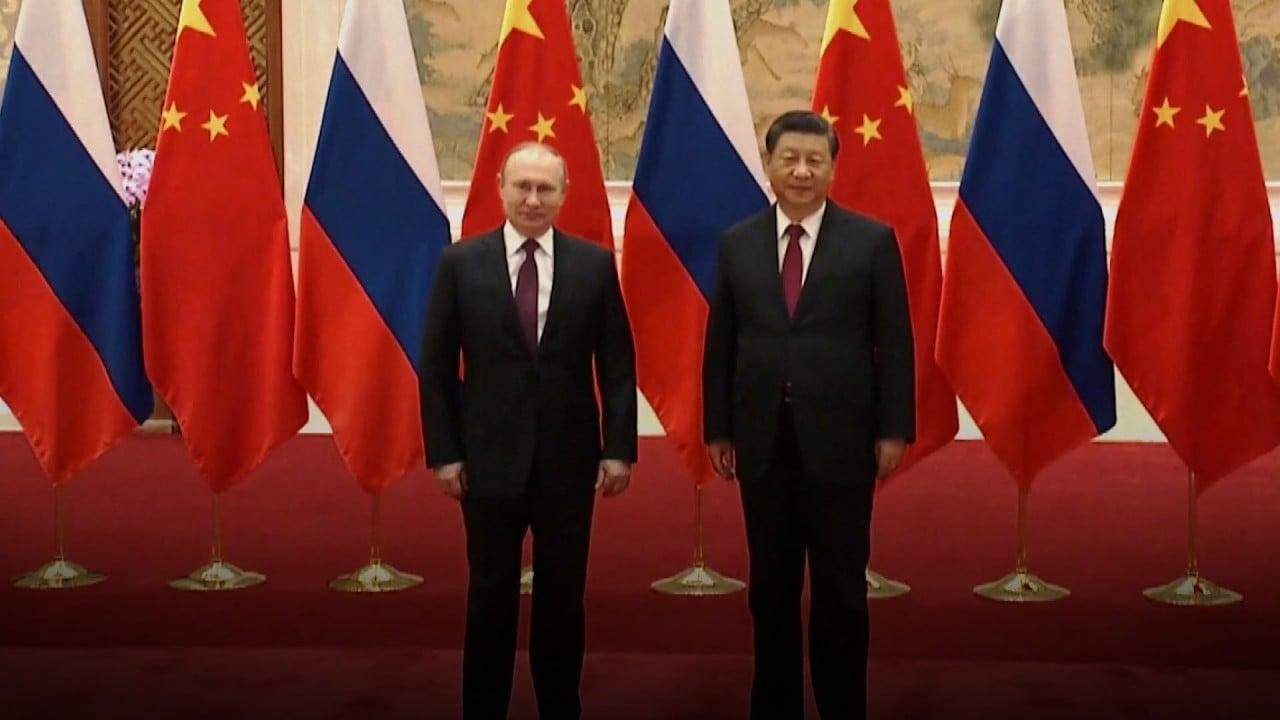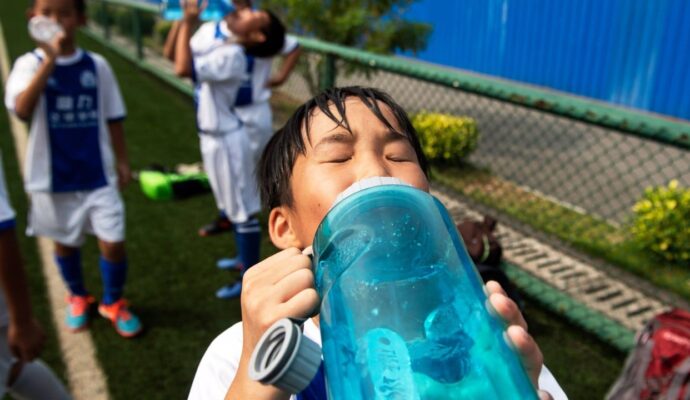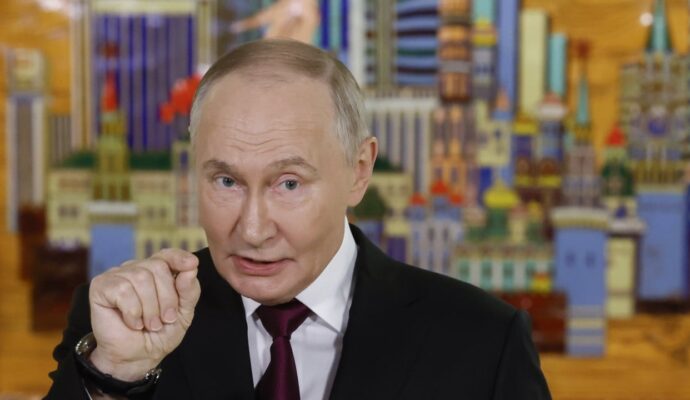
Fu – who referred to the conflict as a “so-called special operation” because “this is what the Russians have called it” – said one of his priorities in his new role was to “depoliticise” EU-China relations. He reminded Europeans that China had called for a peaceful resolution since February 25, a day after the invasion was launched.
“On the second day after the start of that operation, there was an important phone conversation between Chinese President Xi and President Putin and during that conversation, President Xi clearly advocated trying to seek a peaceful solution. So people tend to forget that,” Fu said.
Ukrainian firefighters work to extinguish a blaze at the scene of a Russian shelling in Vyshgorod, outside Kyiv, on November 23. The conflict passed its 300th day this week. Photo: AP
He insisted that China was not benefiting from the war, nor had it any interest in prolonging the conflict.
“We see ourselves as a collateral damage, if you like, of that crisis. Both Russia and Ukraine are good friends, so we do not want to choose between friends. That is the starting point of our position,” Fu said.
He added that “this crisis has put us in a very difficult position, politically speaking” and “put a lot of strain on our relationship” with Europe.
Europe has put China’s relationship with Russia under the microscope since the February 24 invasion launched by Russian President Vladimir Putin.
Just weeks before, Putin visited China at the start of the Beijing Winter Olympics. He and Chinese President Xi Jinping signed a statement saying there were “no limits to Sino-Russian cooperation … no forbidden zones”.
The timing and language of that statement have been scrutinised ever since.
Fu urged Europeans not to “read too much into the terminology” of the agreement.
“I know that people here have some misgivings about the so-called no-limitations relationship,” Fu said at the Chinese mission in Brussels on Thursday.
He insisted that China had similar partnerships with many countries, and that it did not put “artificial limits” on any bilateral relations.
However, he said he was “somewhat disappointed” that after 10 months in which Chinese officials have repeatedly voiced support for a peaceful settlement, Europeans keep raising the “no limits” agreement with Moscow.
“People are still using this [agreement] to say: ‘Oh, China is on the wrong side’.
He continued: “I can understand that immediately after the start of the crisis, European countries, as a knee-jerk reaction, said: ‘how can you reach that agreement immediately before the start of the crisis?’
“But 10 months after that, the facts are shown that China is not providing military assistance to Russia. Actually, our position has been quite balanced, you have to admit, and we are ready to engage in any peaceful efforts.”
On the other hand, Fu said, the United States was “profiting from this crisis”, through selling arms and capitalising on Europe’s energy crisis.
“What is most important is to stop the fighting, to achieve a ceasefire in order to save lives, and we will support all efforts in that respect. We know that some countries or some people in certain countries do not want to see the cessation of hostility. And we don’t think that that is right,” Fu said.
When asked if he thought the US did not want to see an end to the war, Fu said: “That is our assessment.”
“We know that some people are profiting from this crisis. They are selling a huge amount of arms. And also actually, with respect to the spillover effects of that crisis, we know who is profiting from the energy crisis the European countries have experienced,” he said.
The US government did not respond to a request for comment.
If the European governments are so concerned about market access in China, why should they not ratify the CAI?
Concerning the EU’s recent drive to develop defensive measures to respond to China’s trade model, Fu warned that some of the moves “are bordering on protectionism, or even outright discrimination”.
Brussels is finalising instruments to restrict EU market access for businesses that receive subsidies from foreign governments or whose home markets are not open to European firms.
One measure under development would punish countries deemed to economically coerce EU companies or countries, while curbs on Chinese investment are being rolled out across the bloc.
“We are following this with a lot of concern. For some of [the instruments], even though China is not mentioned, we all know that China will be the first to be affected. And we do not believe that they are in line with the free and open market that Europe always claims to be,” Fu said.
Asked why Beijing does not open its own markets for European companies in return, Fu cited the Comprehensive Agreement on Investment, a stalled pact with the EU that would have opened some sectors of the Chinese economy.
“If the Europeans are so concerned about market access in China, why should they not ratify the CAI?” he asked.
“We are ready to build on that. That was a very important first step,” Fu added, saying that the recent Communist Party’s national congress showed that China would open further.
The CAI was derailed by tit-for-tat sanctions last year, launched initially by the EU over alleged human rights abuses by Beijing of the Uygur minority in Xinjiang.
Fu denied any human rights problems in the region, and said that the rationale for EU sanctions was based on “a lot of misinformation, I would say some of them outright lies, fabrications”.
Beijing then imposed retaliatory sanctions of EU lawmakers, academics and diplomats. Fu said Beijing would lift them, but only in tandem with Brussels.
“We are ready to let bygones be bygones. How about lifting the sanctions simultaneously?” he said.
“Are you ready to forsake a huge market like China, because China is not seeing eye to eye on some of the specific human rights issues?”
Nabila Massrali, the EU’s foreign policy spokeswoman, said that “we never comment on the decision-making process regarding sanctions”.
“All decisions regarding sanctions are taken by member states in the council, with council adopting any decisions by unanimity,” she said, adding that “we will continue to call on China to uphold its national and international obligations, and to respect human rights”.
Reinhard Buetikofer, the head of the European Parliament’s China delegation and one of the lawmakers sanctioned by Beijing, was similarly unmoved by Fu’s suggestion.
“Under the given circumstances we have to take note of the PRC’s refusal to change course for at least another year. That is, of course, Beijing’s choice. The ball remains in their court. The EU will not abandon its strong defence of human rights,” he said in a text message, referring to the People’s Republic of China.
Reinhard Butikofer, a member of the European Parliament sanctioned by Beijing, brushed off Fu’s suggestion that both sides drop such penalties: “The EU will not abandon its strong defence of human rights.” Photo: AFP
Buetikofer is among the lawmakers pushing for the EU to negotiate a bilateral investment pact with Taiwan, and was part of the parliament’s trade committee just returned from a trip to the self-governing island this week.
Fu warned that any move to broker an official agreement with Taiwan would violate a commitment made in 1975 by the EU’s precursor, the European Economic Community, not to “entertain any official relations with Taiwan or have any agreements with it”.
“Any country that violates that fundamental principle – well, we cannot sustain our relationship, so people need to understand this,” he said.
“China has zero tolerance when it comes to the Taiwan issue. Anything that infringes upon this one-China policy will certainly be met with strong countermeasures.”


